
Stoneover
Stoneover
The Observed Lessons and
Unanswered Questions of
Cannabis Legalization
Edited by
Nikolay Anguelov and Jeffrey Moyer
LEXINGTON BOOKS
Lanham Boulder New York London
Published by Lexington Books
An imprint of The Rowman & Littlefield Publishing Group, Inc.
4501 Forbes Boulevard, Suite 200, Lanham, Maryland 20706
8690 Paul Street, London EC2A 4NE, United Kingdom
Copyright 2022 by The Rowman & Littlefield Publishing Group, Inc.
All rights reserved. No part of this book may be reproduced in any form or by any electronic or mechanical means, including information storage and retrieval systems, without written permission from the publisher, except by a reviewer who may quote passages in a review.
British Library Cataloguing in Publication Information Available
Library of Congress Cataloging-in-Publication Data
Names: Anguelov, Nikolay, editor. | Moyer, Jeffrey, 1990 editor.
Title: Stoneover : the observed lessons and unanswered questions of cannabis legalization / edited by Nikolay Anguelov, Jeffrey Moyer.
Description: Lanham : Lexington Books, [2022] | Summary: Combining examples of the interplay of the benefits and costs of decriminalization implementation with an honest discussion of the possible negative aspects of recreational legalization and whom it most harms, this book offers policy makers information for future policy designs with a goal to decrease negative externalities and social inequityProvided by publisher.
Identifiers: LCCN 2021048351 (print) | LCCN 2021048352 (ebook) | ISBN 9781793651525 (cloth) | ISBN 9781793651532 (epub)
Subjects: LCSH: MarijuanaLaw and legislationUnited States. | MarijuanaSocial aspectsUnited States. | Drug legalizationUnited States.
Classification: LCC KF3891.M2 S76 2022 (print) | LCC KF3891.M2 (ebook) | DDC 345.73/0277dc23/eng/20211105
LC record available at
LC ebook record available at
 The paper used in this publication meets the minimum requirements of American National Standard for Information SciencesPermanence of Paper for Printed Library Materials, ANSI/NISO Z39.48-1992.
The paper used in this publication meets the minimum requirements of American National Standard for Information SciencesPermanence of Paper for Printed Library Materials, ANSI/NISO Z39.48-1992.
Contents
Paul Musgrave and Clyde Wilcox
Robert Hardaway
Geoffrey Whitebread
Joe R. Tafoya and Melissa R. Michelson
Jeffrey Moyer
Cline Mavrot
Steven White, Catharine M. Curran-Kelly, Paul Bacdayan, and Marion McNabb
Renee Scherlen and Jos Antonio Cisneros-Tirado
Maggie Martin, Rebecca Ivester, Jesse Mishra, Maryam Salihu, Sonja Richard, and Ryan Kling
Nikolay Anguelov, Michael P. McCarthy, and Thalia Valkanos
In 2013, noted drug policy scholars Jonathan Caulkins, Beau Kilmer, and the late Mark Kleiman began their concluding chapter to Marijuana LegalizationWhat everyone needs to know with the short but effective statement We dont necessarily agree, and none of us is sure. Nearly a decade has passed since that writing and when voters in the states of Colorado and Washington charted a new path forward for drug policy in the United States. Over the years, further developments have come at a regular and deliberate pace. According to estimates from the National Conference of State Legislators (NCSL), at least two in five Americans now live in a state with recreational cannabis sales. Data on public opinion on the issue indicate that three in five Americans say that cannabis should be legal for both medical and recreational use.
The voice of the public on the issue has direct political impact on the introduction and diffusion of marijuana reform through the use of direct democracy legislative tools. Generally referred to as ballot initiatives, cannabis reforms have been passed through the use of ballot measures in two steps of the legislative process. The first is the proposal stage, where enough signatures from citizens are needed to actually appear on ballot, along with other proposed legislation on which citizens vote. The next is the formal vote. Formalized as a legislative tool in state constitutions, ballot initiatives are utilized in 26 states and the District of Columbia.
Such legislation is nuanced, different in kind and in type, and increasingly cautious. The chapters in his volume offer a chronological account of the national trend of reform with examples of specific issue foci that explain why, even with the general favorable national attitudes for marijuana legalization, messages of caution are entering the discussion. Elected officials in many states, even more liberal ones that do not have ballot measure provisions, have been more cautious in enacting cannabis liberalization measures (Kamin, 2015) with concerns about a stimulus effect on illegal drug commerce and increases in teen and young adult usea social reality that no decriminalization law addresses (Anguelov, 2018).
Cannabis reforms in their three main incarnations: (1) decriminalization of the possession (and use) of small amounts, (2) medical marijuana laws (MMLs), and (3) legal adult recreational use, only impact citizens 21 years of age and older. Yet, the main cannabis consumer in the United States is and has always been the American teenager. Teen consumption is the topic of analysis in several of the chapters in this book, with national and local sample analyses that evaluate the links between the social support for marijuana use among adults (voting age Americans, as captured by the passing of reforms via formal political channels) and teenagers. Even with such hesitation, the political winds have clearly shifted in favor of legal cannabis sales, with legislators in Virginia, New York, Connecticut, New Mexico adopting recreational measures in 2020 alone.
What now are Americans to make of this new reality? As the haze behind the promises of supporters of commercialized cannabis stores rises, the claims seem difficult to fully evaluate. While many states have seen a steady stream of green tax revenue, the regulated legal market itself faces an uncertain future when put into competition with the still present unregulated cannabis suppliers.
The unregulated cannabis market poses many challenges, especially in California, where much of the nations illicit cannabis is grown. This agricultural growth is nearly all unregulated, consuming a great deal of water resources and imposing a significant environmental cost that contributes to extreme climate events. Nationally, the production of cannabis has various shades of legality that flow into an informal distribution network, creating a gray market. The supply dynamics of it undermine tax revenue, public health goals for product purity and safety, as well as youth diversion, as is the term that has emerged to describe the efforts to educate and prevent increasing teen consumption in states where marijuana commerce is legal to some degree (Saloner, McGinty, & Barry, 2015; Thurstone, Lieberman, & Schmiege, 2011). Officials are still struggling to identify unintended consequences of reform, such as evidence from late 2019 that a chemical used in unregulated vaping products led to increased incidences of a chronic lung disease across the country (U.S. Food and Drug Administration, 2020).
Even in formal legal cannabis marketsthose where cultivation for legal sales is under a regulatory state-level structurethere are challenges of social and economic equity for communities impacted by cannabis criminalization. During legalization efforts, equity provisions can sometimes be twisted as linguistic cover for industry-favored frameworks, while the results can disappoint activists from impacted communities. For example, as New Mexicos legislature acted to legalize recreational cannabis in 2021, Hispanic and Native American communities in the state feared legal cannabis producers would take a disproportionate amount of water. Such activists often lack the political access and resources to match industry lobbyists, even with political leaders nominally sympathetic to their cause. The resulting mismatch of economic opportunities flowing to individuals and communities serves to reinforce, rather than disrupt, structural inequalities, making political compromise on further liberalization and harm reduction approaches more difficult.
Next page
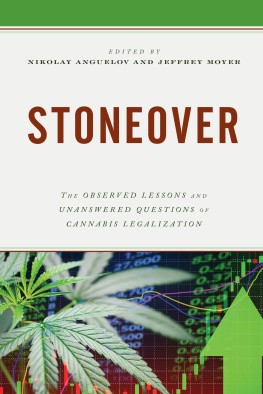





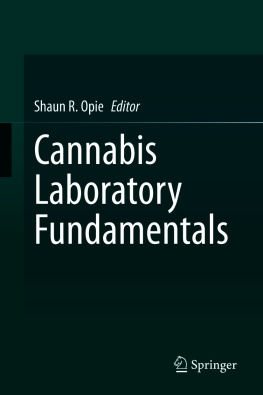
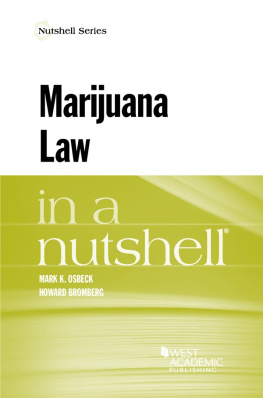
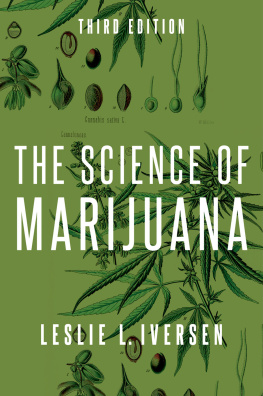
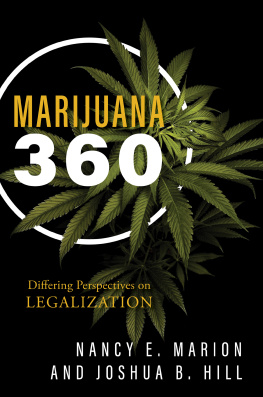

 The paper used in this publication meets the minimum requirements of American National Standard for Information SciencesPermanence of Paper for Printed Library Materials, ANSI/NISO Z39.48-1992.
The paper used in this publication meets the minimum requirements of American National Standard for Information SciencesPermanence of Paper for Printed Library Materials, ANSI/NISO Z39.48-1992.